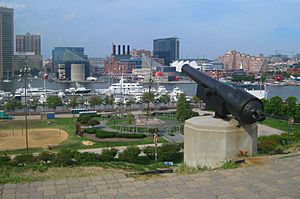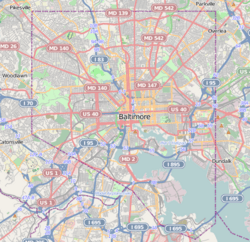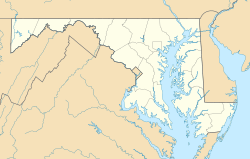Federal Hill, Baltimore facts for kids
Quick facts for kids
Federal Hill
Montgomery |
|
|---|---|
|
Neighborhood of Baltimore
|
|

Federal Hill Park
|
|
| Nickname(s):
Fed
|
|
| Country | United States |
| State | Maryland |
| City | Baltimore |
| Time zone | UTC-5 (Eastern) |
| • Summer (DST) | EDT |
| ZIP code |
21230
|
| Area code | 410, 443, and 667 |
|
Federal Hill Historic District
|
|
| Location | Bounded by Baltimore Harbor, Hughes, Hanover, and Cross Sts., Baltimore, Maryland |
| Built | 1780 |
| Architect | Multiple |
| Architectural style | Greek Revival, Federal |
| NRHP reference No. | 70000859 |
|
Federal Hill South Historic District
|
|
| Location | Roughly bounded by Cross St., Olive St., Marshall St., Ostend St., Fort Ave. and Covington St., Baltimore, Maryland |
| Area | 70 acres (28 ha) |
| Built | 1830 |
| Architect | Jackson Gott and others |
| Architectural style | Federal, Mid 19th Century Revival |
| NRHP reference No. | 03001331 |
| Added to NRHP | December 22, 2003 |
| Added to NRHP | April 17, 1970 |
Federal Hill is a lively neighborhood in Baltimore, Maryland. It sits just south of the city's main downtown area. Many buildings here are part of the Federal Hill Historic District, which was added to the National Register of Historic Places in 1970. Other buildings are in the Federal Hill South Historic District, added in 2003. These districts help protect the neighborhood's old and important buildings.
Contents
Exploring Federal Hill's Location
This neighborhood gets its name from a tall hill that you can easily see from the Inner Harbor. Federal Hill forms the southern edge of the Inner Harbor area. The hillside is a beautiful green space and works as a community park.
Where is Federal Hill Located?
Federal Hill is on the northwestern part of a land area called the South Baltimore Peninsula. This peninsula stretches out between two parts of the Patapsco River. These parts are the Northwest Branch, which ends at the Inner Harbor, and the Middle Branch. Other neighborhoods on this peninsula include Locust Point and Riverside.
Federal Hill's Borders
Historically, Federal Hill has a rough triangular shape. It is bordered by Hanover Street to the west. To the north and east, it's bordered by Hughes Street, the harbor, and Key Highway. Cross Street forms its southern border.
Things to Do in Federal Hill
Federal Hill is a great place with lots of things to see and do. It has many shops, restaurants, and fun activities for everyone.
Cross Street Market: A Community Hub
The Cross Street Market is a historic marketplace built in the 1800s. It's still a busy spot for residents today. This market is the main social and shopping center for the neighborhood. It's a place where people gather and find what they need. The market has been renovated recently to make it even better.
Shopping and Dining Options
The main shopping and business area is found between Montgomery, Ostend, Light, Charles, and Hanover Streets. Here, you'll discover many restaurants with all kinds of food and prices. There are also many small shops and some larger stores for everyday needs.
Fun Events and Activities
Federal Hill is a popular spot for people who enjoy taverns and live music. The neighborhood hosts street festivals several times a year. These events are planned by active local groups. They also organize the yearly "Shakespeare on the Hill" series, which features summer plays in the park on Federal Hill. The neighborhood is also home to the American Visionary Art Museum and the Maryland Science Center.
Schools and Libraries
Federal Hill has several schools for students. These include Federal Hill Elementary School and Thomas Johnson Elementary Middle School. There's also Francis Scott Key Elementary and Middle School, and Digital Harbor High School. For books and learning, the public library is the Light Street Branch of the famous Enoch Pratt Free Library.
Getting Around Federal Hill
Federal Hill is easy to reach and has good transportation options. This makes it simple for residents to get around the city.
Major Roads and Highways
The neighborhood is close to major highways like Interstate 95 and Interstate 395. The Baltimore-Washington Parkway is also nearby. Charles Street and Light Street are important roads that run north and south through Baltimore.
Public Transportation Options
If you prefer public transport, parts of Federal Hill are within walking distance of light rail stops. These include the Hamburg Street and Camden Yards stations on the Baltimore Light Rail. The Charm City Circulator is a free bus system that serves central Baltimore. Two of its routes, the Purple Route and the Banner Route, serve Federal Hill.
Federal Hill's Past: A Look Back
Federal Hill has a rich history, from early mining to important events in American history.
Early Days and Mining Operations
Long ago, during the colonial period, Federal Hill was a place where people mined for paint pigments. There are still several tunnels under the park today. Sometimes, parts of these tunnels can collapse, creating dips in the ground near the surface.
A Public Gathering Place
From the very beginning of Baltimore's history, the hill was a special public gathering spot. It was named "Federal Hill" in 1789. This happened after a parade ended there, followed by a big celebration. People were celebrating the approval of the new "Federal" Constitution of the United States of America.
Signal Hill: Watching the Ships
For much of Baltimore's early history, the hill was known as Signal Hill. This is because it had a special observatory for ships. People working there would watch ships sailing up the Patapsco River. They would then signal their arrival to business owners downtown. This helped merchants know when their goods were coming.
The Civil War Era
During the Civil War, Federal Hill played an important role. On the night of May 12, 1861, after the Baltimore riot of 1861, about a thousand Union troops took over the hill. They were led by General Benjamin F. Butler. They arrived secretly during a thunderstorm. During the night, Butler's men built a small fort with cannons pointing towards the city center. Their goal was to make sure Baltimore and Maryland stayed loyal to the United States government. This fort and the Union army stayed on the hill throughout the Civil War. Today, a large flag, a few cannons, and a small monument remind us of this time.
Federal Hill Today: Growth and Change
In recent times, Federal Hill has transformed from a working-class area into a popular and thriving neighborhood.
Changes in the 20th Century
In the 1900s, Federal Hill was a neighborhood where many working-class families lived. By the late 1970s, it faced challenges like rising crime and older homes. Many industrial jobs, especially in shipyards and factories along the Patapsco River, were disappearing. The Bethlehem Steel shipyards, for example, closed in the early 1980s.
Neighborhood Revival and Investment
However, things began to change. A program in nearby Otterbein helped people buy and fix up homes. This sparked interest in Federal Hill, and it became a popular place for investment. Many young professionals who worked downtown started buying and renovating homes here.
Continued Growth and Popularity
The growth and investment in downtown Baltimore and the Inner Harbor in the 1980s and 1990s made Federal Hill even more popular. A second wave of strong investment began in the mid-1990s. This included not just fixing up single-family homes but also large building projects on old industrial sites, especially near the water. Inside the neighborhood, many new restaurants and shops have opened. The city's population grew in 2006 for the first time in decades, with much of that growth happening in Federal Hill. Streets that once had empty houses are now fully renovated, and many families have moved in.

 | Jessica Watkins |
 | Robert Henry Lawrence Jr. |
 | Mae Jemison |
 | Sian Proctor |
 | Guion Bluford |




